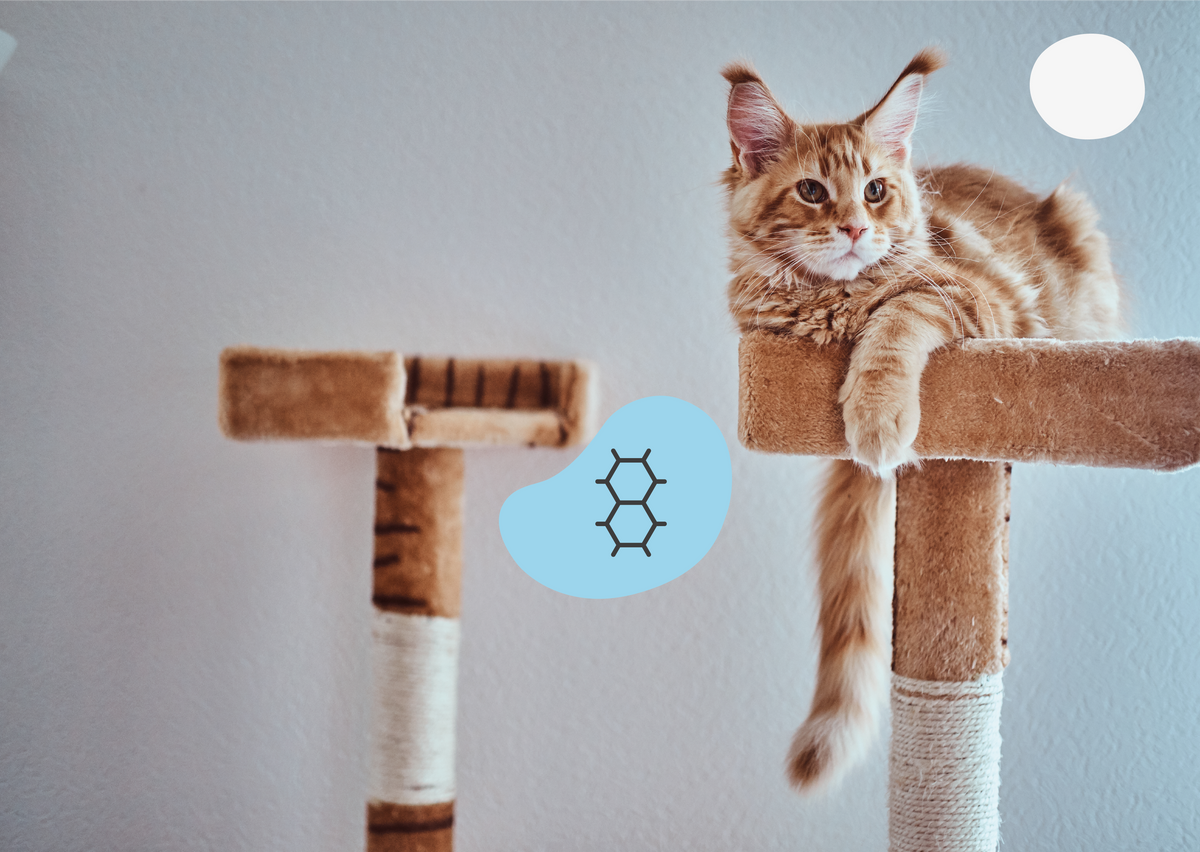My cat is stressed, what can I do?

Like humans, animals, and especially cats, have their own personalities. While some are playful, excited or calm by nature, others can suffer from anxiety and stress. If this is the case with your cat, it is quite legitimate to feel helpless in the face of the situation. But rest assured, there are several solutions today to soothe your four-legged friend, whatever the source of his anxiety. We take stock of the stress your cat is under and explain how to relax him.
Identifying the signs that your cat is stressed
Before finding solutions to reassure your cat, you need to be sure that her behaviour is a sign of stress. Anxiety in cats is an emotional state that can be characterised by :
Uncleanliness
The urinary bladder is often one of the first organs affected by excess stress. Unusual uncleanliness in your cat is often the first indication that your four-legged friend is under stress.
Aggressiveness or stress
Does your pet shy away, flinch at the slightest noise or spit aggressively? This characteristic is often one of the signs that your cat is suffering from stress. Some felines even develop what is known as "Rolling Skin Syndrome", which results in a bristly coat and a shivering back.
Eating disorders
In the face of stress, your cat may develop eating disorders such as bulimia or anorexia. Some cats will eat compulsively and throw up as soon as they finish, while others will lose their appetite and even refuse to eat.
The appearance of fussiness
Does your cat show sudden and repeated nervous or hyperactive behaviour? Does it remain motionless for several hours or develop a sudden interest in an object by touching it for several minutes? Your cat has developed a fuss, which is often a sign of stress.
Find out what the causes of stress in your cat might be
Is your cat suffering from one or more of the signs listed above? Now we need to find out what the causes of this stress might be in order to treat it in the best possible way. The main sources of stress in cats are usually related to :
Disturbance of its territory
If your cat is having work done, being rearranged, or even moving house, it may indeed experience some stress.
The arrival of a new family member
Whether it's a new pet, a baby or even one or more friends who are just coming to stay for a weekend or a few days, any arrival can be the disruptive element that will trigger stress in your cat.
A change in diet
If you think you're pleasing your cat by varying its diet, this is a mistake that will actually increase its anxiety and stress. It is important to feed your cat a good quality diet and not to change it if it is suitable.
Poor food distribution.
Cats eat several small portions a day, so giving them their food at fixed times, two or three times a day, may be the reason why they are stressed.
Transport by car
Some cats suffer from car sickness just like humans! If yours doesn't, it may simply be that the car journey is associated with something it doesn't enjoy (usually a visit to the vet for example!)
An illness
Unfortunately, stress can also be the result of another illness in some cases. If you have any doubts about your cat and would like to be reassured, please consult your vet.
Taking the right steps to relieve your cat's stress
The attitude of the owner of an anxious cat
The first thing to do to try and calm your cat is to adapt your attitude to his stress. Speak to your cat in a confident but calm tone of voice, without raising your voice or reprimanding your cat if it has done something wrong. Above all, she needs to feel safe and secure, especially if she's a new kitten who's just joined the family and needs to get used to her new surroundings!
As well as a gentle voice, don't skimp on physical gestures to calm your cat: cuddle therapy is now considered a science of providing comfort through slow, gentle psycho-emotional touch, to provide comfort and security.
Discover our Calme product
Using certain products to calm an anxious cat
There are certainly some tablets and medications available to relieve your cat's stress. However, before opting for this solution, it's best to use products that use more natural means to try and ease your pet's anxiety:
· Anti-stress collars for cats
There are now some collars that use herbal and aromatherapy techniques to calm stress disorders in cats. These help to prevent anxiety states from worsening and leading to other more serious problems, including the development of infectious diseases.
· Anti-stress diffusers for cats
If your cat cannot tolerate necklaces, you can opt for sprays or diffusers that will transmit the calming properties of plants and other vegetation into your pet's environment.
· Opting for food products that are suitable for anxious cats
Eating disorders are one of the main signs of stress in cats. One of the best ways to relieve your pet of this emotional state is to feed a diet that is healthy, appetising and contains soothing properties. This can be a complete meal such as a portion of kibble, but also snacks to supplement your cat's diet if it is already suitable.
While giving your cat small treats can help soften her temper and make her feel less stressed, they are most effective when they are made with ingredients designed to calm your feline.
This is the case, for example, with Marly & Dan's tender Calm Cat Bites. Made with salmon, these snacks also contain other natural ingredients that help your cat feel more calm. These include chamomile, a plant known to combat anxiety-related disorders, and valerian, a plant with active ingredients with relaxing properties.



